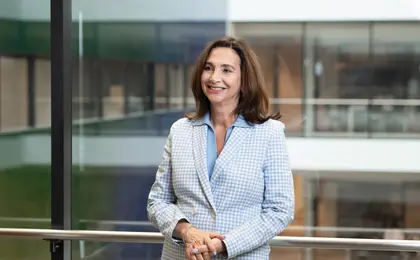
Lindsay Greene ’11
MBA
President and CEO, Brooklyn Navy Yard Development Corporation
When Lindsay Greene ’11 graduated Harvard in 2003 with a degree in economics, she knew she wanted a “business” job. But her career aspirations were also shaped by her childhood in Washington, D.C., where she rode trains and buses constantly and gained a respect for the freedom and vitality urban spaces can provide.
Greene ended up joining Goldman Sachs’ newly formed Urban Investment Group, which invests in urban real estate and in women- and minority-owned businesses, with a focus on community and economic development. Working on the group’s real estate projects, Greene learned that “I can do business and urban and city things together,” she recalls. “I never knew that was possible.”
Six years later, when she started looking at graduate schools, Greene homed in on Yale SOM, attracted to the school’s focus on social impact. The school’s integrated core curriculum taught her to cultivate and lead effective teams and organizations. “SOM really ingrains in you that the people in your organization matter, and your organization is its own living, breathing thing,” she says.

After earning her MBA, Greene spent four years working at the online grocer FreshDirect and another small consumer food startup, but she wanted to return to her roots in urban development. A coffee chat with her former manager at Goldman Sachs, who had since become a New York City deputy mayor, led to a job in the mayor’s office, where Greene assisted with the city’s efforts to finance and grow small businesses. From there, it was a natural step to her current position as president and CEO of the Brooklyn Navy Yard Development Corporation, stewarding a former shipyard that now houses more than 550 businesses.
This new role situates Greene, the first Black and openly LGBTQ+ person to lead the Navy Yard, at the intersection of the public and private sectors. The Navy Yard is owned by New York City and managed by a nonprofit, and it houses public initiatives such as an employment training center and a technical high school. But the 300-acre industrial park is largely occupied by privately owned enterprises, including a storied delicatessen , a quantum networking producer and a camera refurbishment business. Navy Yard businesses employ over 13,000 people, and the organization describes itself as “a critical pathway to the middle class for many New Yorkers.”
Greene says that in the future, she wants the Navy Yard to attract businesses working on healthcare and climate change solutions, as well as other mission-driven organizations. “I want this place to reflect the diversity of New York City in its demographic makeup and in the breadth of ideas we work on solving,” she says.
As she charts the Navy Yard’s future, Greene says, she’s guided by the practical lessons she learned at SOM and the school’s mission of educating leaders for business and society.
“There’s a purpose in every business, and you have to connect to that purpose,” she says. “At Yale, that is fundamentally core, and I think you come away knowing that you have to make an impact.”





